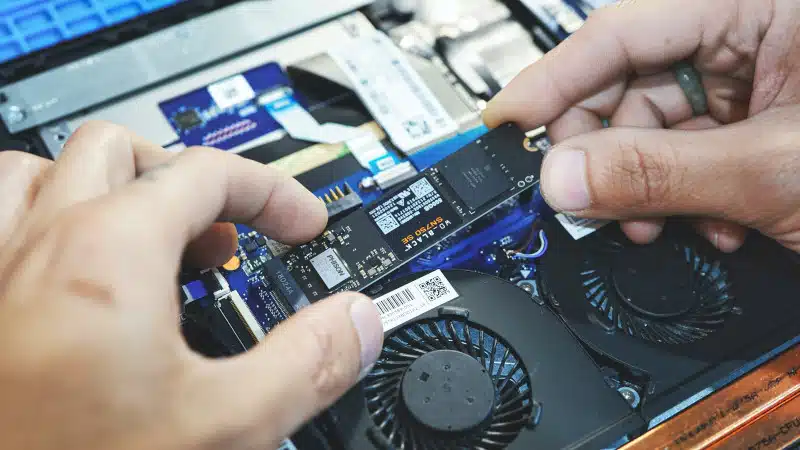Solid-state drives (SSDs) have revolutionized storage solutions, offering unprecedented speed and efficiency to modern computing.
Enhanced Performance
The hallmark feature of SSDs lies in their lightning-fast read/write speeds. This crucial advantage translates into an immediate and noticeable enhancement in system performance. By switching from traditional hard disk drives (HDDs) to SSDs, users experience instantaneous application launches, seamless file transfers, and a remarkable reduction in boot-up times. The capability of SSDs to handle multitasking with finesse further elevates their appeal, allowing users to seamlessly run multiple applications simultaneously without the usual performance constraints.
In addition to speed, SSDs significantly contribute to energy efficiency. Their streamlined architecture consumes less power than HDDs, making them an eco-friendly choice without compromising performance.
Improved Reliability and Durability
Unlike HDDs that rely on spinning magnetic disks prone to mechanical failures, SSDs operate on solid-state flash memory. This absence of moving parts renders SSDs shock-resistant and impervious to physical impact, ensuring data integrity even in rugged environments. The reliability and durability of SSDs not only protect against data loss but extend the lifespan of devices, making them ideal for both personal computing and industrial applications.
The Evolutionary Impact of SSDs
The pervasive influence of SSDs extends beyond individual devices; it shapes industries and accelerates technological advancements. SSDs have revolutionized data centers, offering unparalleled speeds in handling vast volumes of information, thereby enhancing the efficiency of cloud computing and data processing. Moreover, adopting SSDs in gaming consoles and high-performance computing has redefined the gaming experience, enabling faster load times and seamless gameplay.
Longevity of Solid-State Drives (SSDs)
The lifespan of a solid-state drive (SSD) is a common concern among users evaluating storage options. Unlike traditional hard disk drives (HDDs) that rely on spinning platters, SSDs operate using flash memory chips. While SSDs do not have moving parts susceptible to mechanical wear, they have a finite lifespan determined by the number of write cycles they endure.
Typically, consumer-grade SSDs can last several years, often outlasting their warranty periods. Manufacturers provide endurance ratings, usually measured in terabytes written (TBW), indicating the total amount of data that can be written to the drive before potential performance degradation. High-quality SSDs designed for regular consumer use can endure hundreds of terabytes written, ensuring reliability for everyday computing tasks over an extended period.
Moreover, advancements in technology continue to improve SSD durability and longevity. Wear-leveling algorithms distribute data evenly across the drive, mitigating the impact of constant read/write operations on specific memory cells and prolonging the SSD’s lifespan.
Disadvantages of Solid-State Drives (SSDs)
While solid-state drives (SSDs) offer numerous advantages, they are not without limitations:
- Cost per GB: SSDs are generally more expensive per gigabyte than traditional HDDs. Although prices have decreased over time, the cost disparity remains a consideration for those needing larger storage capacities at a lower price point.
- Limited Write Endurance: SSDs have finite write cycles despite their durability. Continuous and intensive writing activities may lead to eventual degradation and reduced performance over the drive’s lifespan, although this is less of a concern for typical consumer usage.
- Storage Capacities: While SSD capacities have been increasing, they might not match the colossal storage sizes available in HDDs. HDDs still offer a more viable option for users requiring terabytes of storage at an affordable price.
Balancing these considerations against the significant advantages of SSDs is essential when choosing storage solutions, ensuring that users select the most suitable option based on their specific needs and budget constraints.
Solid-state drives (SSDs) have emerged as a transformative force in modern computing, providing unmatched speed, reliability, and durability. Their impact extends across industries, reshaping how data is stored, processed, and accessed. As the digital age continues to evolve, SSDs stand tall as a fundamental pillar of innovation, continually driving progress and efficiency in the ever-expanding tech landscape.
Ready to experience the lightning-fast performance of solid-state drives (SSDs)? Contact PCMechanic Computer Repair in Davenport, FL, and upgrade your system for unmatched speed and reliability!
Image Credit: Photo by phiraphon srithakae


